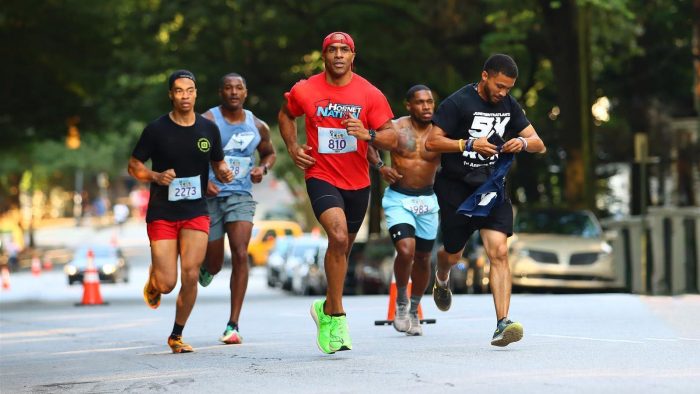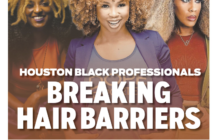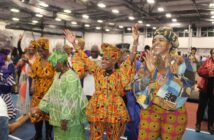HBCU homecoming season is usually reserved for the fall when alums of historically Black colleges and universities return to their former campuses to catch up with old friends. On Saturday, the National HBCU Alumni Alliance Inc. will bring that energy to the summer with its 17th annual HBCU 5K Run/Walk. Participants run or walk for 3.1 miles and come together at the end for the Alumni Row tailgate when local alumni associations set up tents, tables, and fellowship.
Another unique element of the event is that it happens simultaneously in three cities, led by satellite HBCU Alumni Alliance groups in Atlanta, Philadelphia and Washington. Living up to their motto of “Run for you. Run for them. Run for us!” each branch combines the funds from registration fees, donations and sponsorships to fund scholarships for local HBCU students.
HBCU Alumni Alliance CEO Dan Ford, an alum of North Carolina A&T State University, created the event in Atlanta in 2007 after Marck Dorvil, a fellow alliance member, expressed disappointment that he hadn’t seen many Black people participate in the city’s flagship running event, the Peachtree Road Race.
Kristin Herring crosses the finish line at the HBCU 5K event June 24, 2023, in Washington.
DC Metro HBCU Alumni Alliance
“He came to us asking how we can get more people of color involved in these organized runs,” Ford said, since the assumption then was that Black people don’t run. “And we said, ‘Well, what if we did our own organized run?’ But you gotta think, 17 years ago, asking people of color to get up on a Saturday morning to go out to a park and run, and pay for it, was unheard of. People said it was the dumbest idea they ever heard.”
There have been essays, books, studies, TV series, podcasts and other discussions about how Black people weren’t interested in running. Among the reasons for the lack of interest are a fear of “running while Black,” and thus being exposed to racial harassment and violence, the cost of entering races and the safety and walkability of Black neighborhoods. Those barriers mean Black people don’t see one another running, giving them less motivation to try it. Add this to the belief that running doesn’t hold the same cultural cachet as basketball or football, and the result is many African Americans sitting on the sideline and missing out on many of the reported mental and physical benefits of running.
In creating the run/walk, the HBCU Alliance wanted to change these attitudes, but they almost proved their naysayers right. According to Ford, the inaugural race in 2007 at Grant Park in Southeast Atlanta drew only 250 participants. For many, 250 Black people gathered at the park is a certified function. However, that number looks like a failure considering Atlanta is home to four HBCUs, with extended family via alums and Black Greek-letter organizations. The alliance increased its promotion, and the following years saw incremental improvements as word spread. Local running clubs such as Pretty Girls Run and Black Men Run started bringing their crews, but there were still small numbers of runners.
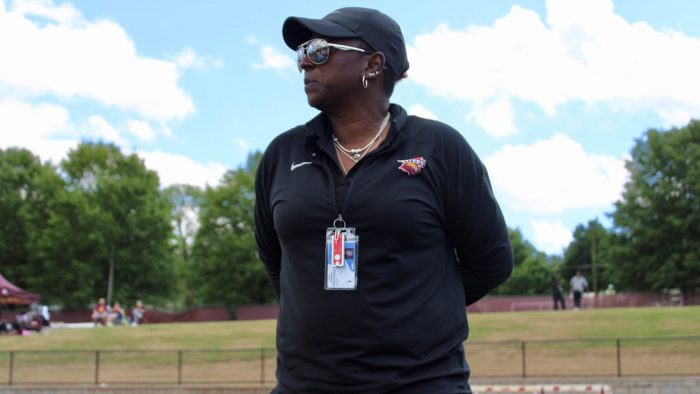 Edward Waters University assistant coach will mentor athletes for U.S. Olympic trialsRead now
Edward Waters University assistant coach will mentor athletes for U.S. Olympic trialsRead now
Not yet able to hire professional race event consultants, volunteer organizers struggled with providing basics such as T-shirts, bibs and even proof of registration. However, people kept paying to sign up, eventually generating enough income to pay professional organizers. Ford and his staff introduced the Alumni Row tailgate experience, where schools set up their own tents, and the ones who raised the most money received preferred placement.
In the early 2010s, Ford added a 10K race to attract more serious runners. These decisions initially paid off as attendance increased to 2,500, forcing the race to switch locations to the larger Piedmont Park in the densely populated Midtown area. The move created higher expenses because there were more streets to cross, resulting in higher costs for permits and police officers. As a result, Ford kept the course in the park, a decision he said was a disaster. One year, he even tried to appease runners who complained about running in the morning heat and held the event at night, which was another mistake. In 2015, seeing the numbers declining, Ford decided to cut the 10K, added vendors to the tailgate and shifted the focus to attracting more walkers. Registration has increased every year since.
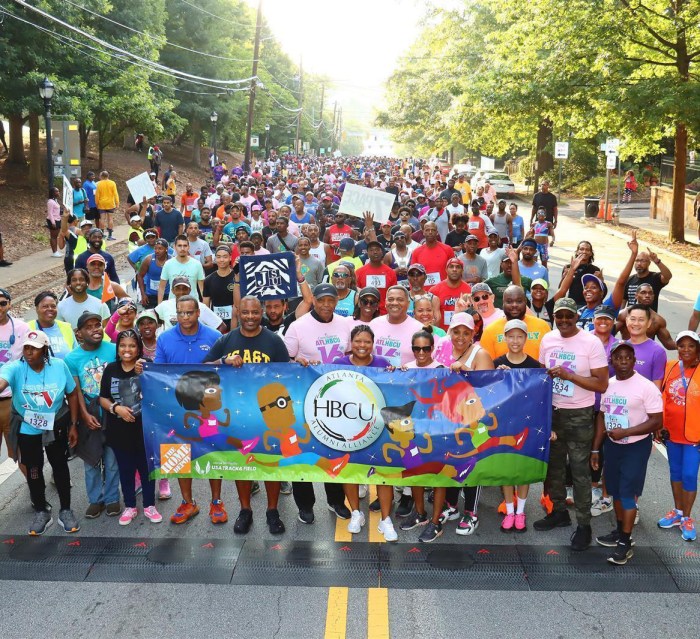 A group gathers for the HBCU 5K event held on June 24, 2023, in Atlanta.
A group gathers for the HBCU 5K event held on June 24, 2023, in Atlanta.
True Speed Photography
“You already know how we bring the smoke when things don’t go right, and people had every right to be upset,” said Ford, noting the only years they saw less participation was in 2020 and 2021, when they switched to a virtual option because of the coronavirus pandemic. “Some of our processes were not great experiences, but they stuck with us.”
“One of my first races that I ever did was the HBCU 5K when I first started running,” said Tes Sobomehin Marshall, a respected Atlanta race director and founder of The Race, the nation’s largest Black-owned and operated half-marathon. She has participated in the HBCU 5K as a runner, volunteer and vendor. “It’s literally like the Black runner homecoming in Atlanta.”
Even as the Atlanta HBCU Alumni Alliance was still figuring things out, a demand grew for similar experiences in cities with a high HBCU graduate presence. The first group to create a franchise race was the DC Metro HBCU Alumni Alliance in 2013. Their race was held on the campus of Howard University and stayed there until 2019, moving to the Black-owned St. James Sports Complex in Springfield, Virginia, after a change in leadership. Hearing the negative feedback about the 14-mile drive, they moved the race back to Washington this year and will start at MLB’s Nationals Park. The Philadelphia HBCU Alumni Alliance was created in 2020, and it hosted its first race virtually in 2021. The group currently holds its race across the Delaware River at Cooper River Park in Pennsauken, New Jersey.
“Doing all of the races on the same day is us working together and amplifying it because we recognize that the bigger the stone you throw into the pond, the bigger ripples you make,” Ford said.
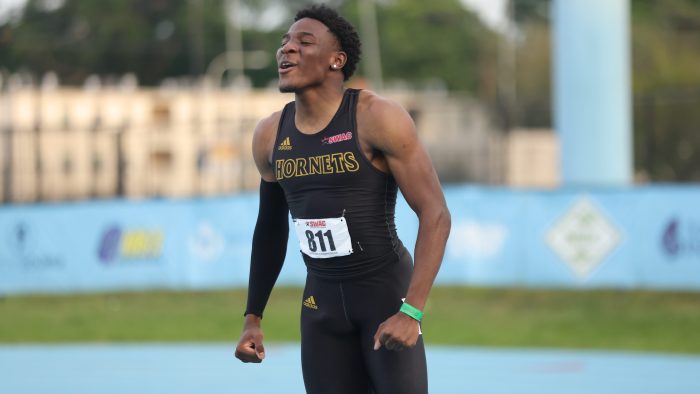 Track and field stars from Black colleges have one goal at Olympic trials: Get to ParisRead now
Track and field stars from Black colleges have one goal at Olympic trials: Get to ParisRead now
The event also serves as a way to bring together even more alums from surrounding areas.
“We’ve got three different Hampton University alumni chapters in our consortium from Virgina, Maryland and D.C.,” DC Metro HBCU Alumni Association President Tanye Coleman said. “But in our alumni row, we only have one tent for Hampton University so they’re not competing with each other. They’re all getting together.”
One of the race’s primary goals is simply to get more Black people active. However, the Atlanta course is certified by the USA Track & Field governing body, so the race still attracts competitive runners. The times are official and can be used to qualify for other races such as the Peachtree Road Race on July Fourth, and many runners use the Atlanta HBCU 5K to tune up for it. This includes non-Black runners who show up for an easy win to pad their stats.
“They were like, oh, that’s a certified race so I’m gonna come out here and just bring the smoke,” said Ford, who says the event is open to all, including Black people who didn’t attend HBCUs. “There were years when I wondered what’s happening right now. We’re giving out medals and ain’t nobody looking like us. But over a period of time, our gazelles started coming out.”
“There’s competition out there with some very good runners,” said Delaware State University alum Shannon Booker, who leads Atlanta running group Movers & Pacers. Booker moved to Atlanta in 2017 and said running in the race has helped him connect with other HBCU alums and Black people in the city. He’s been a top finisher each year he’s participated and won the race in 2022. “For me, it’s just a good time because, unfortunately in a lot of the races I enter, I don’t see many of us, let alone at the front of the pack.”
“I keep telling people, hey, anyone can participate, not just your alums,” said Philadelphia HBCU Alliance president Gregory T. Wilson. “Everybody’s money is green when it comes to supporting the mission.”
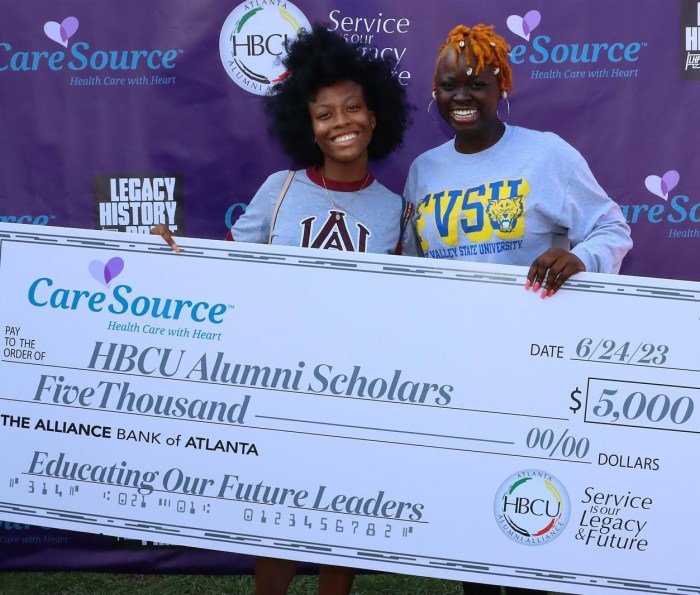 Scholarship recipients Abony Jones (left) and FaDima Marie Keita (right) in Atlanta.
Scholarship recipients Abony Jones (left) and FaDima Marie Keita (right) in Atlanta.
True Speed Photography
Supporting the mission is also a competition. When people sign up for the race, they can register as a member of one of their local alumni associations. As the totals increase, they can also see which schools are raising the most scholarship money, motivating them to spread the word and get more people registered on their behalf. People who don’t plan on participating physically to “exercise their wallet” and donate separately. HBCU Alliance members also use professional connections to get corporate sponsors to support the cause. The results are that some HBCU students get a few hundred dollars to buy books, others receive larger grants from corporate sponsors, and the alumni associations receive a cut of the money they raised on their own, which can be used at their discretion.
“We’re not taking any proxies,” Ford said. “You have to be here, because we want them to experience like this is your HBCU family. So you can’t send your auntie to come get your check.”
“I’ve used that money to help me buy books and a laptop, which I really needed coming into college because the one I already had was definitely rundown,” said Howard University student Sydney Wynn, who has won the DC Metro Alliance scholarship twice. “People are always looking for big scholarships that will give you complete full rides, but people don’t realize that applying for scholarships like this really adds up.”
HBCU alums donating and registering also helps since historically Black universities have been underfunded for decades. Since 1987, HBCUs have been underfunded by the government by at least $12 billion compared to predominantly white institutions. A 2023 study by research groups Candid and ABFE found that large U.S. foundations decreased their HBCU funding by 30% between 2002 and 2019. However, President Joe Biden announced that his administration has invested $16 billion in HBCUs over the last three years.
“You never know politically what type of funding will be available,” Wilson warned, emphasizing that it’s still up to HBCU alums and alliances like this one to do their part. “You’ve heard horrific stories on how many institutions have been shortchanged by the state from getting their federal allotted dollars. There’s hundreds of millions of dollars that schools were supposed to get, but they didn’t.”
While HBCUs may still be miles behind predominantly white universities in funding, efforts like the HBCU 5K Run/Walk are helping close the gap.
Most people will tell you that Maurice Garland is a dude from Decatur, Georgia, who’s written some memorable stories about extraordinary people during some (mostly) unforgettable times for some legendary publications. Others will say they saw him talking on VH1 a couple of times or speaking at Spelman and Princeton. Many will mention that he started one of hip-hop’s first podcasts (Day 1 Radio), co-wrote a book about mixtapes (The Art Behind the Tape), and then edited Pimp C’s autobiography and J. Prince’s memoir. Now they are saying all he does is run marathons, do yoga and teach teenagers journalism and media making at VOX ATL. None of them are wrong.
